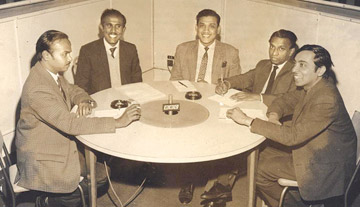Sucharitha Gamlath: a postscript
 Our friend, the debater, the university don, literary critic and the
well known broadcaster is no more. But those of us who used to associate
him recall certain factors pertaining to his scholarship and
controversial nature. Agreeing to disagree was one of the main
standpoints most of us had with him. May it be political or literature,
creative activities or teaching, he had lots of misgivings with his
fellow mates. This inherent factor itself was the most identifiable and
indivisible element he possessed over the years. Our friend, the debater, the university don, literary critic and the
well known broadcaster is no more. But those of us who used to associate
him recall certain factors pertaining to his scholarship and
controversial nature. Agreeing to disagree was one of the main
standpoints most of us had with him. May it be political or literature,
creative activities or teaching, he had lots of misgivings with his
fellow mates. This inherent factor itself was the most identifiable and
indivisible element he possessed over the years.
With Sucharitha’s death, I am sure there is a void created. The void,
being the loss of an orientalist who was well versed in languages such
as Sinhala, Pali and Sanskrit. My intimacy with him triggered off in
London, when I was with the BBC’s Sandeshaya. He was a regular
contributor to the programme. I saw a certain degree of freshness in his
presentations. Prior to the meetings in London we had also met during
various book launch sessions and literary events. Back in Sri Lanka
during the early 70s, Sucharitha Gamlath was seen active in radical kind
of political thinking that stemmed out of Marxian thought and Trostkyian
ideology as opposed to the then extant left political parties. He was
trying his best to blend the Marxian thought and literary criticism to
remould a new literary canon.
I am not sure if it really materialised into a particular mode of
alternative thinking.
Perhaps what was most visible is his two sides of thinking: Sanskrit
Rasavada (aesthetic rhetoric) scholarship and radical material working
class socialist ideology. But during the late 70s there grew an
attraction to Sucharitha Gamlath both in the capacity of a literary
critic and a university lecturer.
I had close contact with him when he was the Professor of Sinhala at
the Jaffna University. He invited me to be a visiting lecturer on Mass
Communication. I took the night train in Colombo and the stay was a
couple of days. He would pick me up in the station and ride me to his
quarters in his cycle. My lectures were scheduled once a month.
 |
|
BBC Sinhala Service on March 25, 1968.
Sugathapala de Silva (L), Sunanda Mahendra, Sucharita
Gamlath, Gunadasa Amerasekara and Wimal Dissanayake arrived
in Bush House, Headquarters of the BBC External Services for
a literary discussion. The discussion was broadcast on April
16, 1968. |
This was the period when he commenced his prolific journey into
writing especially academic type of books for students and several
translations. He had translated quite well two long short stories of D H
Lawrence: ‘Fox’ and ‘Odour of Chrysanthemums’. He also translated
Brecht’s short but powerful play ‘King Luculs’ into Sinhala which Dhamma
Jagoda produced as a workshop exercise with his students. He simplified
‘Ramayana’ as ‘Bala Ramayanaya’. Then he brought out a simplified
version of Mahabharata. Amidst his interest in translations he had
brought out several volumes pertaining to the subject of visualizing
theories of literature as pronounced by Leon Trotsky (titled in Sinhala
as ‘Leon Trotsky saha Sahitya kala’). He, as a scholar, edited such
classical Sinhala works as Kavsilumina (together with Professor M B
Aryapala).
As a broadcaster he was known for the controversies put across via an
educational discussion programmes titled as ‘Rupana’ produced by the
late broadcaster Tilak Jayaratne. Later the well known book publisher S
Godage published most of these embedded material. When the literary
verdict of Sucharitha became bitter, the late Professor Sarachchandra
coined a term ‘dennam bate vicharaya’ which meant ‘flogging criticism’.
But professor Sarachchandra remained a favourite teacher of Sucharitha –
he wrote a series of articles assessing Professor Sarachchandra’s works.
The series became a booklet titled as ‘Guru Guna Samara’ (in memoriam of
the virtues of a teacher). With politics interspersed, Gamlath delivered
from time to time guest lectures to students to usher in a new literary
critical canon or rather a school.
I doubt whether it really clicked. He was also a Sinhala columnist to
several Sunday Sinhala newspapers on his retirement from the university
activities. He kept himself busy by compiling a two volume English –
Sinhala dictionary. This I feel is his real magnum opus up to date.
Herein if one were to scan the hefty two volumes, some rare English
slang words are inserted too.
This should have been the work of a group of academics, but well done
by a single energetic scholar.
[email protected]
|





